ARLINGTON, Va. (Army News Service, Oct. 8, 2007) -- Six Brazilian Soldiers and a woman who served in the Russian Army led a field of more than 17,000 runners in the 23rd Army Ten-Miler Sunday at the Pentagon.
Spc. 1st Class Jose Ferreira of Rio de Janeiro outkicked fellow Brazilian Army Spc. 1st Class Reginaldo Campos Jr. over the final 100 meters to win America's largest 10-mile road race in 49 minutes, 21 seconds. There were 26,000 runners registered for the event.
Spc. Campos finished a couple of strides behind Spc. Ferreira with a time of 49:22, followed by Brazilian Army Corps' Josueldo Nascimento (third in 49:40), Marcelo Vecchi (fourth in 49:56) and Lielzio De Jesus (15th in 52:44).
Firaya Sultanova-Zhdanova, 46, a former soldier from Naberegmnie Chelni, Russia, who lives in Gainesville, Fla., won the open women's division with a female masters race record time of 58:31 on perhaps the hottest day in Army Ten-Miler history.
An accomplished road-racer, Ms. Sultanova-Zhdanova recently won the masters women's crowns at the Peachtree Road Race 10K and and the Houston Marathon. On Sunday, she took control early.
"I ran by myself from the start," she said of running through an interpreter. "I was gone from 500 meters."
Ms. Susannah Kvasnicka, 35, of Great Falls, Va., was the second female finisher in 59:11.
"I felt pretty good through five miles," said Ms. Kvasnicka, women's champion of the 2005 Marine Corps Marathon who is training for the 2008 U.S. Olympic Marathon Trials. "But then I started to feel the heat a little bit. I never saw the (women's) leader, so it's pretty hard to go for somebody you can't see."
The lead pack of 10 male runners passed the 1-mile marker in 4:44. During the second mile, Spc. Ferrieira and fifth-place finisher Tamrat Ayalew, a Kenyan running for Atlanta-based Team Foot Solutions, opened a 30-meter gap on the second pack of runners from Brazil, Kenya and Ethiopia. They passed the 2-mile mark in 9:29.
Two more Brazilians re-joined the front-runners shortly before the five-mile mark in 24:30. The lead quartet remained together through the eight-mile mark at 39:38. From there, Spc. Ferreira and Spc. Campos managed to open a sizable gap before sprinting to the finish line.
"I was setting the pace for most of the race," Spc. Ferreira said through an interpreter. "I was a little worried about the wind because it's always stronger when you're leading. But I knew what to expect from (Spc. Campos) at the end, and I thought I could out-sprint him."
Mr. Ayalew, who won the 2006 Potomac Half-Marathon, improved one spot on his fifth-place Army Ten-Miler finish in 2006.
"At nine miles, my legs weren't working well and I lost some speed," he said.
Four-time Army Ten-Miler women's champion Alissa Harvey was touched to be issued the No. 1 bib, which usually is worn by the pre-race favorite to win the event.
"Getting the number one bib, as a female, I think is a wonderful thing," said Ms. Harvey, 42, USA Track and Field's 2007 Masters Female Athlete of the Year from Manassas, Va. "I've never seen that happen before and I was very honored. As a women's advocate and a master's runner, I'm very proud to wear number one. And because it is the Army Ten-Miler and I'm so proud of the U.S. and the Soldiers and the moving story of the gentlemen and women that are the Missing Parts In Action Team, I can't be more proud and excited to be an American. It's a wonderful race and I will be here every single year."
Ms. Harvey finished fifth among women in 1:00:34.
"The heat was my first concern," she said. "I think I played a very smart race with the conditions and it went just the way I wanted it to. I always love to win and I didn't get to, but it was a great race with a lot of good competition this year."
By the fourth mile, Ms. Harvey realized her shot at victory had slipped away.
"Usually, I make my move there, but I couldn't see any (women) so I knew it was gone, it was over," she said. "The heat was nasty. I actually had to stop at two water stops because my cup fell and I had to go back and get another to pour on myself."
The Missing Parts in Action Team fielded military amputee teams from Walter Reed Army Medical Center in Washington, D.C.; Brooke Army Medical Center at Fort Sam Houston, Texas; and the San Diego Naval Medical Center. Along with a team of their physical therapists, it was MPIA's largest turnout in four years of participating in the event.
Team captain Maj. David Rozelle lost his right foot to an anti-tank mine in June 2003. After nine months of grueling rehabilitation, he was declared fit for duty and took command of the 3rd Armored Cavalry headquarters unit only one year after he lost his foot. He is the first amputee in recent military history to resume a dangerous command in the field.
"It is hard to believe that we are on our fourth year for this Missing Parts in Action Team," Maj. Rozelle said. "Each year we have grown. Our first year it was just a few of us, our second was 12, and last year we doubled to 24. This year, we will make our strongest showing yet with 41 and will represent all three centers.
"This is an exciting chance to show America that we are not beaten," Rozelle continued. "It's very motivational to run with the other Soldiers -- a very powerful homecoming to know in the heart of your country.
Ed Salau, a medically retired first lieutenant from the Army National Guard, had an above-the-knee amputation after being hit in Iraq by a rocket-propelled grenade in 2004. He currently serves as the East Coast Director of the Wounded Warrior Project, which provides programs and services to enrich wounded Soldiers' lives via sports participation. Seeing last year's MPIA team prepare to run the Army Ten-Miler inspired him to join the team for not only his first Army Ten-Miler but his first 10-mile run.
First Lt. Ivan Castro, a former weapons sergeant in a Special Forces Group who remains on active duty, was blinded last September by fragments of a mortar round that landed about 5 feet to his left in Iraq. Although he lost his right eye, lost all vision in his left eye, and had his right index finger amputated, Castro completed the run while tethered to his training partner.
"I'm happy with my performance today," said 1st Lt. Castro, 40, who finished in 1 hour, 25 minutes. "It's just been one year, one month and five days since I was injured in Iraq. Last year, about this time, I was lying in bed with IV lines and external fixaters and wound vaccinaries, so I'm happy with my recovery. This is a product of all the hard work that all of those medical personnel did, and my loved ones. With a little bit of willpower, motivation and determination, I was able to do this."
Stationed at Fort Bragg, N.C., 1st Lt. Castro said he plans to return to Arlington Oct. 28 for his second race as a visually impaired runner in the Marine Corps Marathon.
"My plan was to take it nice and easy the first mile, and my first mile was the fastest," admitted 1st Lt. Castro, who got caught in the commotion and excitement of the throng of runners at the starting line. "Once I hit that third mile, we had some gazelles come by. Someone told me that they were Brazilians, but those guys just flew by me. And all along the route, from that moment on, everybody that came behind me was cheering me on.
"Even as guys were passing me, they were cheering me on. And the crowd all along. And the Army band was out playing. The water stations. The whole thing was just tremendous."
A group of more than 35 military wives from Fort Stewart and Hunter Army Airfield in Georgia also ran and supported the event in honor of their deployed husbands of the 3rd Infantry Division. Many of them are dealing with a third deployment.
"I believe we represent the families of deployed soldiers and the spirit of Army Families everywhere in that our running is one of the many ways we carry on and don't quit while our loved ones are gone," said Mrs. Gabrielle Winton, whose husband, Lt. Col. Doug Winton, is deployed to Iraq for the second time. "Running the Army Ten-Miler as a group shows solidarity, and a desire to keep physically healthy. But more than the physical benefits of running, we all enjoy the emotional benefits."
"When we're running with friends, laughing and talking through problems, things just seem better. We have a saying that 'the longer I run, the smaller my problems become'- it is so true. I think it's important to have groups like ours out there so that people don't forget that for every Soldier serving, there is a family he or she left behind. Those families are making a huge sacrifice too and we're just as proud to do it."
All proceeds from the Army Ten-Miler support programs of the Army Family and Morale, Welfare and Recreation Command, based in Alexandria, Va., for Soldiers and their Families.
(Mr. Tim Hipps writes for the Army Family and Morale, Welfare and Recreation Command.)
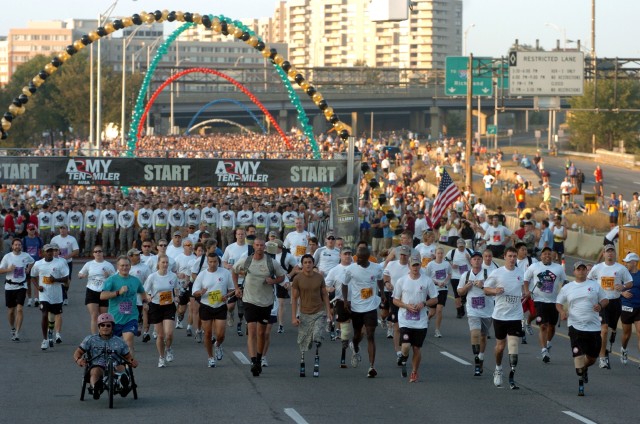
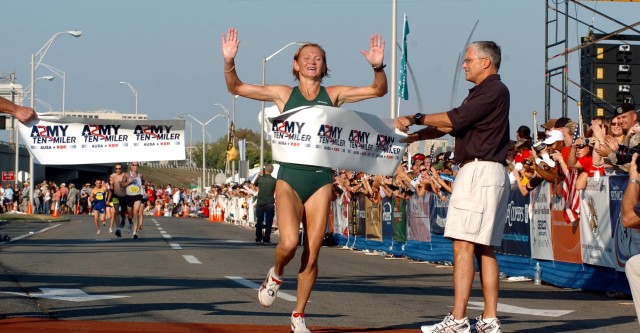
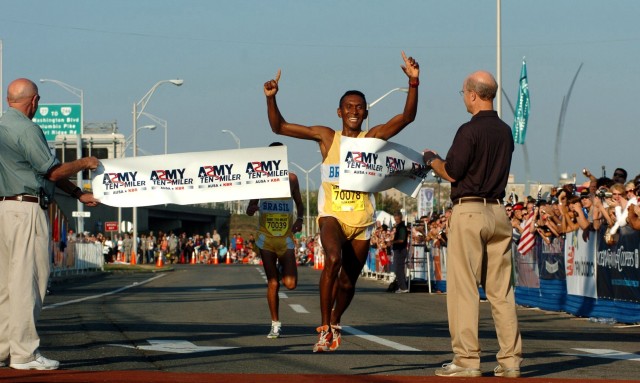
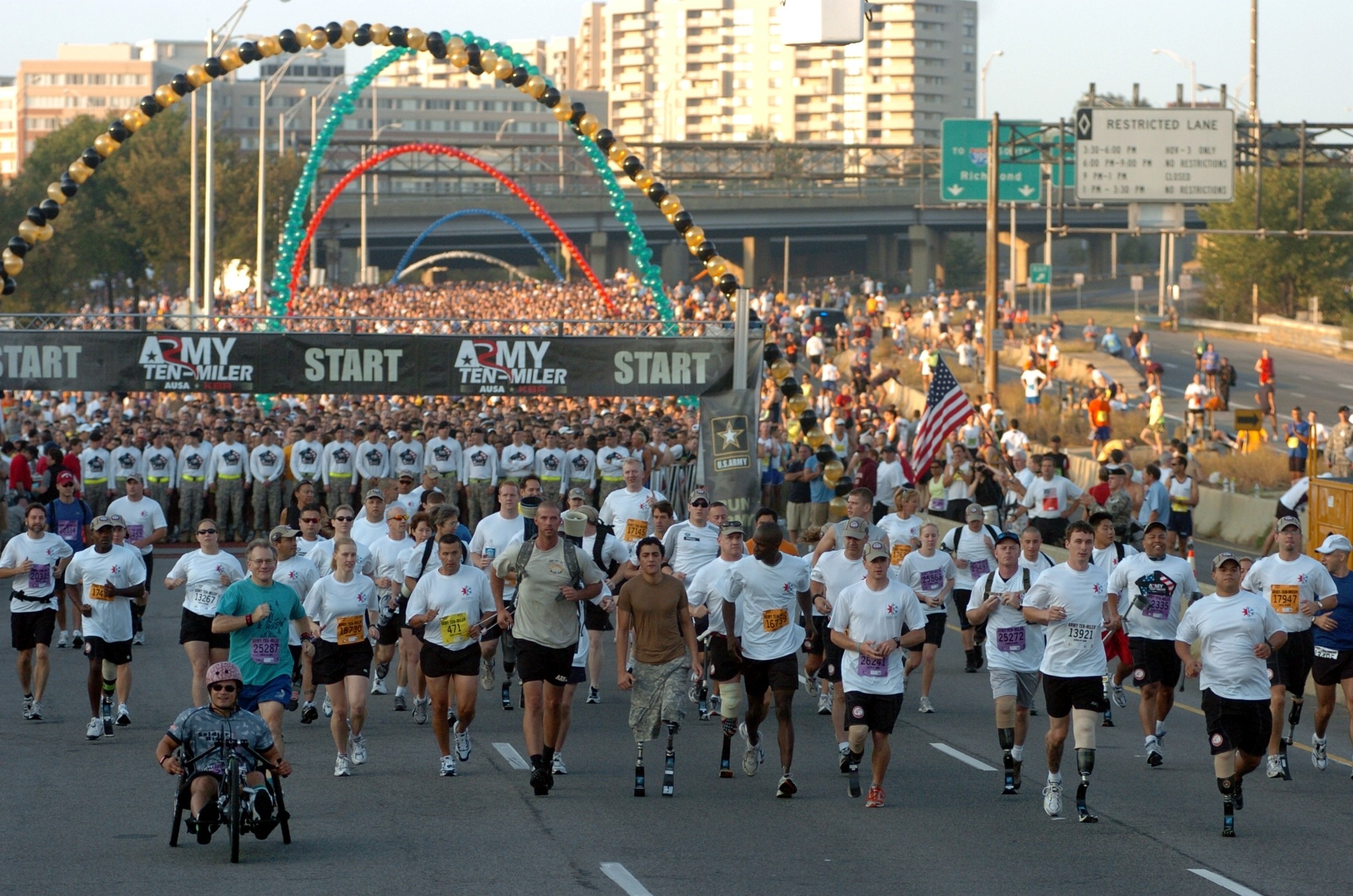
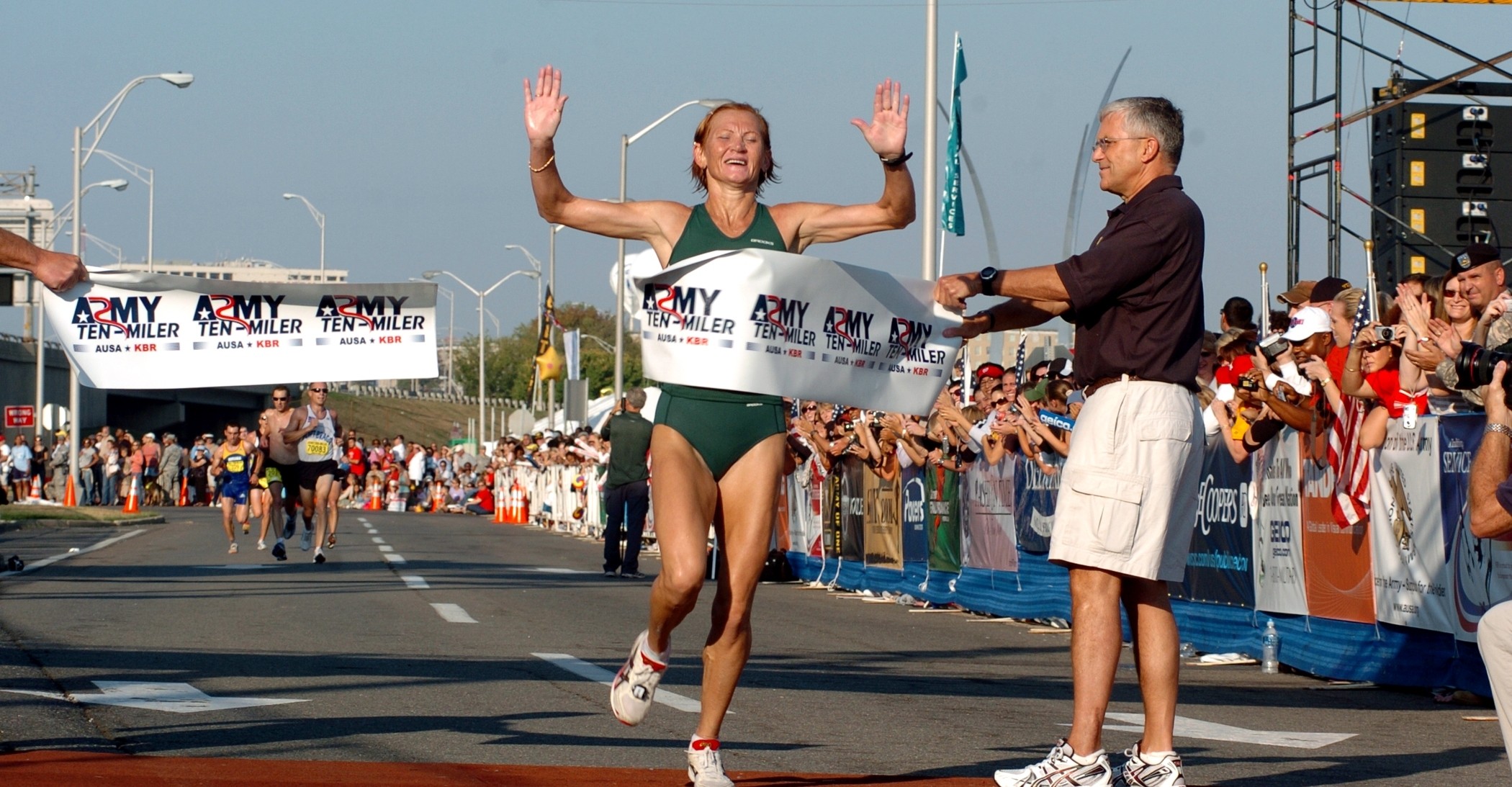
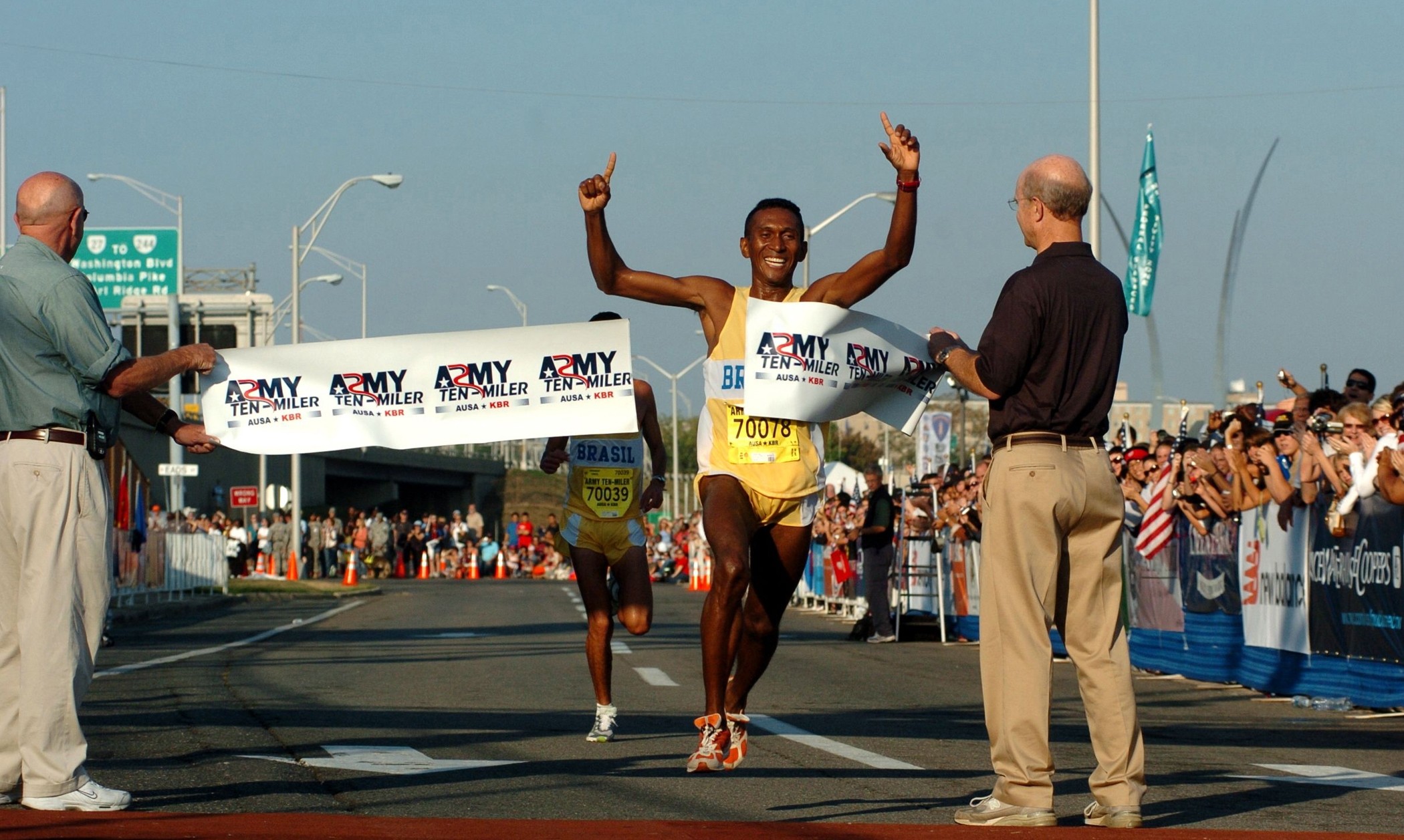
Social Sharing